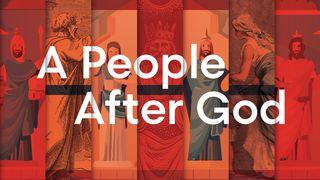Delve Into Luke-Acts & Paul's LettersSample

DAY 13 – ROMANS II
Paul begins his teaching section by asking not who has a greater right to the gospel (as the Romans might have put it) but who has a greater need of it. He demonstrates that “Jews and Gentiles alike are all under the power of sin,” and so both have an equal need for the gospel. Both groups are under God’s “wrath,” meaning that God is displeased with the way they’re living and will have to judge and punish them if things don’t change. But there’s good news. People can be forgiven, and they can still live as God expects. Paul explains that “now apart from the law the righteousness of God has been made known. . . This righteousness is given through faith in Jesus Christ to all who believe.”
Paul then appeals to the example of Abraham, the ancestor of the Jewish nation, to demonstrate that God’s offer of forgiveness is being extended on an equal basis to both Jew and Gentile. He observes that God actually accepted Abraham on the basis of his faith before he was circumcised. In that way, Paul writes, Abraham became the spiritual father of “all who believe but have not been circumcised” and of “the circumcised who not only are circumcised but who also follow in the footsteps of the faith that our father Abraham had before he was circumcised.” When we are accepted by God through faith in Jesus Christ, Paul continues, our relationship with God is restored. We no longer need to worry about God’s wrath. He says of Jesus, “Since we have now been justified by his blood, how much more shall we be saved from God’s wrath through him!”
Paul must now address one more concern as he draws his teaching section to a close. The Romans are probably prepared at this point to grant that God’s forgiveness is being offered to everyone on an equal basis. But people haven’t been responding equally. Those God chose first, the Jews, generally haven’t believed in Jesus, but Gentiles are responding in great numbers. How can this be? Paul explains that “Israel has experienced a hardening in part until the full number of the Gentiles has come in.” In other words, God has actually chosen to restrain the response of the Jews in order to create an opportunity for non-Jews to hear about Jesus. When these non- Jews hear and respond, this will help Jews to believe as well. As Paul explains, “Salvation has come to the Gentiles to make Israel envious. . . Inasmuch as I am the apostle to the Gentiles, I take pride in my ministry in the hope that I may somehow arouse my own people to envy and save some of them.” The implication is, even if the Roman church wants to reach out specifically to Jews, the most effective way for them to do this right now is by supporting Paul’s mission to the Gentiles.
Having explained and defended his teaching and mission, Paul concludes the main body of the letter with a practical section. He challenges the Romans to live the kind of new life, both individually and in community, that will show they’ve been restored to fellowship with God through Jesus Christ. If there are religious practices the community disagrees about, they should each develop their own convictions. But everything they do must be done out of love and concern for others. They should see themselves as one people of God, even though they’re Jews and Gentiles and will reach different conclusions about matters such as keeping kosher and observing the Sabbath.
Paul ends this long letter by sharing his travel plans, asking formally for the church’s support, and passing along greetings to and from mutual friends. he closes with a final wish that “all the Gentiles might come to the obedience that comes from faith.”
PRAYER: Lord, help me to build up my neighbors for their good, accepting them just as Christ accepted me.
Scripture
About this Plan

Luke-Acts is a two-volume history that provides an overview of the New Testament period and allows us to see where most of the other books fit into the larger picture. Luke was one of Paul’s co-workers in sharing the good news about Jesus, so reading Paul's letters alongside Luke-Acts helps us to understand where Paul's letters fit into both their historical context and the larger Biblical story.
More
Related plans

Be Still and Know

7 Habits of a Mature Disciple

And His Name Shall Be Called

Built to Serve

Christmas in Psalm 16: Fullness of Joy

Lessons From Some Hidden Heroes in the Bible

A People After God

Made for This

Impulses for the Way: 30 Days on the Camino De Santiago
